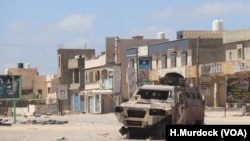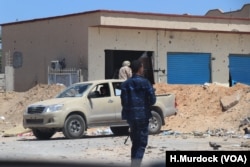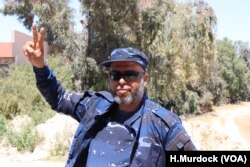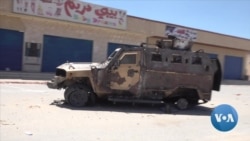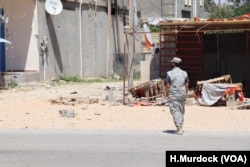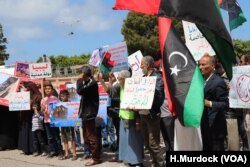In a suburb of Tripoli on Monday, two gunshots ring out kilometers from where the fighting was only the day before.
“Sounds close,” my colleague says, as a young man walking through a sandy lot ducks and runs. Around the corner, another man continues his stride as if nothing happened.
A police car pulls into the street, and officers who appear to be in their early 20s jump out, telling civilian cars to turn around. The road is now closed, they say, as military trucks fly by.
More police arrive quickly, telling us the battle is now hot and we cannot go any closer.
About three weeks ago, Khalifa Haftar, who leads Eastern forces known as the Libyan National Army, announced he would take the capital, Tripoli, by force. But since then, the U.N.-recognized government in the West, known as the Government of National Accord, has mostly held them at bay.
But over the weekend, airstrikes hit Tripoli city and clashes intensified in the suburbs. By early afternoon on Monday, the LNA overran a military camp, Yarmouk, just south of the city. By late afternoon, soldiers from the GNA said they had taken the area back.
Later in the day, airstrikes hit a restaurant near a prison, and fighting in another suburb begins anew.
“They brought tanks, machine guns and anti-aircraft missiles,” says Mohammad Turkey, a GNA special forces soldier guarding a checkpoint in an abandoned neighborhood that was packed with residents only a month ago. Armored trucks, a few Humvees and pickup trucks carrying soldiers whip past the recently made berms as Turkey and his men keep civilians out of the battle zone.
A woman pulls up in a small white sedan and tells him that she wants check to see if her nearby house is still standing, and unscathed.
“No one can go in,” says Turkey.
Displaced
Several kilometers inside the city, among breezy tree-lined streets, many of the people displaced by the conflict bunk at schools fashioned by local aid workers into displacement camps.
Men stay on the ground floor and women reside upstairs with the children, waiting for this battle to end. The U.N. says 42,000 civilians have been displaced, and at least 22 have been killed since the fighting began.
Twelve-year-old Takwa wears a white baseball cap over her long, curly ponytail. She can list the major players in this and three other complex Libyan wars she has lived through since 2011, when she was 4 years old.
This battle, she says, seems particularly brutal. Before she fled her home with her mother and siblings less than two weeks ago, three or four bullet holes pierced her bedroom wall.
“My 6-year-old brother pretends to shoot weapons,” she says. “We have no childhood.”
A few rooms over, Nadia Mohammad, 31, sits on a mattress on the ground in a pink T-shirt and soft pants. Her five children roam in and out of the room but don’t leave the floor. Nadia also remembers the details of every war, and every time they feared for their lives or for their livelihoods.
Before 2011, when an armed uprising backed by western forces ended the 42-year rule of the late Col. Moammar Gadhafi, life in Mohammad's quiet suburb was stable and secure. She doesn’t name Haftar as her choice for successor, but she has doubts about Libya’s long-beleaguered peace process.
Her country remains fractured, with numerous local militias and separate governments leading coalitions of armed forces that not too long ago fought among themselves. Families like hers are often caught in the crossfire.
“In my opinion, we should have one leader, one boss and one everything,” Mohammad says. “The situation in these past years is not what we want.”
WATCH: Libya Battle Intensifies After Tripoli Airstrikes
Decentralized government
Many of Tripoli’s local leaders and activists, however, have an opposite vision for the future. The goal, they say, is to unite the country and create a decentralized, democratic government, leaving behind Libya’s history of one-man-rule.
Some hoped that peace talks that were scheduled for mid-April could move the country closer to a unity agreement. But when Tripoli was attacked, negotiations stalled and the talks were canceled.
So far, the war has not turned out as Haftar planned. The swift takeover has turned into a drawn-out, violent stalemate.
But efforts to build a functioning democratic system continue, says Nabil Mohammed el-Khamri, a civil society activist in Tripoli. Officials continue to hold municipal elections across the country, hoping to establish local governments in nearly every Libyan district.
This, he says, will create a structure from which a national parliament and eventually a head of state can be elected.
“The steps of creating a democratic system have been ongoing since 2011,” el-Khamri explains. “The problem is the decentralized government in the West and the centralized government in the East are crashing together.”
Asked if he hopes a government emerges that resembles established democratic systems like The Netherlands, England or France, el-Khamri says: “Libya will set a new way. Why should we not do it the way we see is right?”
Foreign meddling
Outside the Tripoli Ministry of Foreign Affairs the next morning, there is a sign that this idea could be gaining popularity. A protest gathers with demonstrators demanding an end to foreign meddling in Libya, which some see as hypocritical at best, and at worst, a direct assault on the nation.
“We have paid a lot of blood for our dreams,” says protester Jamal Harizi. “But the international community is not committed to our needs.”
The international community is divided, with some countries supporting Haftar, even though the U.N. supports the Tripoli government. The U.S. opposed the attack on Tripoli, but that position has been muddied by U.S. President Donald Trump’s well-publicized phone call with Haftar last week.
But at the berm on the outskirts of the battle, Turkey, the special forces soldier, says he has little interest in the tangled politics of his country. His duty, he tells us, is only to serve and to provide for his family.
“If I’m still alive after this, I will go back to my children,” he says. “If I die, they can be proud I died defending their homeland.”




